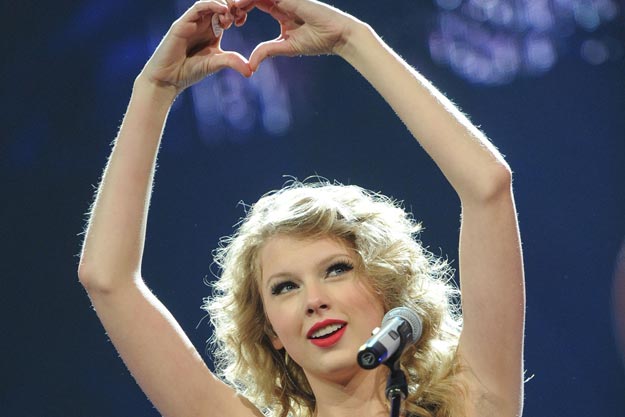I’ve always identified with music and songwriting. When I was a young and hyperemotional tweenaged girl, I would look to the pen and paper to express my feelings of heartache over silly little twelve-year-old boys who liked my sister better than me. I still, to this day, have notebooks piled high of documented embarrassing crushes—yikes. So, being a self-proclaimed songwriter, I idolized Taylor Swift, who seemed to understand exactly what I was experiencing as I navigated my way through discovering what love meant.

I related so intimately to Taylor’s music that I had a boy that came to mind when listening to “Teardrops on My Guitar,” and the only thing that was different about my crush and the boy in “Hey Stephen” was the name. When I went through my first break up, “White Horse” was my anthem, and when my best friend got pregnant at 14, I ached with the song “Fifteen” and could feel the lyrics pressing into my soul. It’s encouraging to have someone understand you when you’re growing up and speak to the struggles you’re facing. For me, Taylor Swift was that encourager.
And like me, Taylor Swift grew up. In many ways, this is a very good thing. I left those old silly crushes behind, learned to be much more independent and—praise the lord—I no longer own corduroy pants. Taylor has also gone through some important changes, too. Her style has matured, her lyrics have become deeper and she totally rocks the bob! However, her portrayal of love has also drastically changed. With her most recent album, “1989,” the public and media were concerned with her transition from the traditional “country” genre and into an era of pop, but my concern was less with stylistic choices and more with the ideology behind her music.
Taylor pioneered through different albums like “Speak Now” and “Fearless,” but as she approached her album “Red,” a change began in the way she spoke about love. In her earlier childish music, Swift romanticized love and break-ups. Heartache was a beautiful melody that connected her to her listeners. I remember when I was a freshman in high school, and my first boyfriend broke up with me at my house while my family had a huge group of friends over. I snuck up to the flat roof of my country home and looked at the vast sky speckled with stars.
While I was sad, I was also existentially connected to Taylor Swift. She knew this feeling and was able to help me savor the emotion of heartache, because when your heart is broken, you know that the vulnerability you exchanged in the relationship had the potential of turning into love. However, as “Red” was released, vulnerability transformed from a quality Taylor cherished into one that she rejected. She became more of a realist in her lyrics, proclaiming that “We are never ever ever getting back together” and exposing her foolishness in the anthem “I Knew you Were Trouble.” Love, to Taylor, became synonymous with recklessness and treachery.
Another important change that began to reveal itself in “Red” was Taylor’s changing ideology around the concept of forever. In the past, she believed in the permanence of love, but with her coming-of-age album, she lost the belief in love’s longevity.
In her song “Never Getting Back Together,” Taylor proclaimed this worldview with her lyric, “I used to think that we were forever and ever.” No longer did Taylor believe in forever and ever.
While we started seeing the change in the “Red” album, Taylor’s cynical worldview really came to fruition in the “1989” album. No longer did she write songs about the cute boy driving her around the small town in his truck. Her lyrics became darker, dirtier, more sensual. She became less concerned about love and more concerned with lust and temporality. When I first heard her new album, I was going through a break up, just as I was four years before on my star-spangled rooftop. But her songs this time, rather than encourage me that love would find me again, promised me that love was overrated and eternally painful. Heartache was no longer a necessary part of love, but rather a foolish part of ignorance.
While “Red” began to question the idea of forever, “1989” completely threw it away. In “Wildest Dreams,” Taylor didn’t think the relationship in question was going to last—in fact, there was never an intention of the relationship lasting. In her first verse she proclaimed, “Nothing lasts forever.” In the bridge, she continued with the theme, saying, “Someday when you leave me.” It makes sense in this particular song that forever is not an option, because in the music video, it is revealed that this man who she is tangled up with all night is married. Not only has Taylor entered into a world of love being temporary, but also of marriage being moot.

However, “Wildest Dreams” is not the most cynical of her newer songs. In her song “Blank Space,” Taylor revealed her newfound ideology of love. There is a stark contrast between her earlier lyrics and some of the lyrics in this song like, “You look like my next mistake. Love’s a game. Wanna play?” Rather than embracing heartbreak, love and true emotion, Taylor rejected these feelings and traded them for a shallow replacement. She continued her cynical rant in this song through positing, “Boys only want love if its torture,” and “I’m dying to see how this one ends.” No more teardrops for Taylor, only making bad boys good for a weekend.
Let me clarify: This is not written out of animosity towards T. I love her, and I secretly know all the words to all of her songs—even the not-so-great ones about love. And this is not to caution you against listening to her music—seriously, who doesn’t like to shake it off every now and then? But, as she has grown up, she has compromised her innocent understanding of and giddiness toward love.
Some people might argue that this is inevitable as we age. That cute boy who wrote love notes in your seventh grade science class is now a lot taller and also a lot less inclined to write us a sappy note. He might swipe right on Tinder and buy us a drink, but let’s be honest, he probably won’t be asking us to the dance any time soon.
How do we then transition from a time in which we over-romanticized love to a time in which we condemn it outright? Should we follow in Taylor’s footsteps and stop believing in forever? I don’t think the answer is that simple. I do believe, however, that Taylor might not be on the right track—not the platinum-award-winning track, but the track to truly finding love.
Why should we care about Taylor’s evolution from romantic to cynic? I am not claiming to believe in indoctrination theory or the idea of the hypodermic needle, because I don’t think it’s that linear. Watching one aggressive television show won’t make you an aggressive individual, just like listening to one T Swift tune from her newer albums won’t make you a cynic about love; but, I do believe it is important to critically engage with the messages we expose ourselves to—especially messages around fundamental things like love.
While Taylor Swift might be great to jam to every now and then, I will no longer be using her music for relationship education. I do still believe in forever and I do still believe in marriage and while I wish Taylor and I could be “Forever & Always.”

















[…] So, being a self-proclaimed songwriter, I idolized Taylor Swift, who seemed to understand exactly w… […]